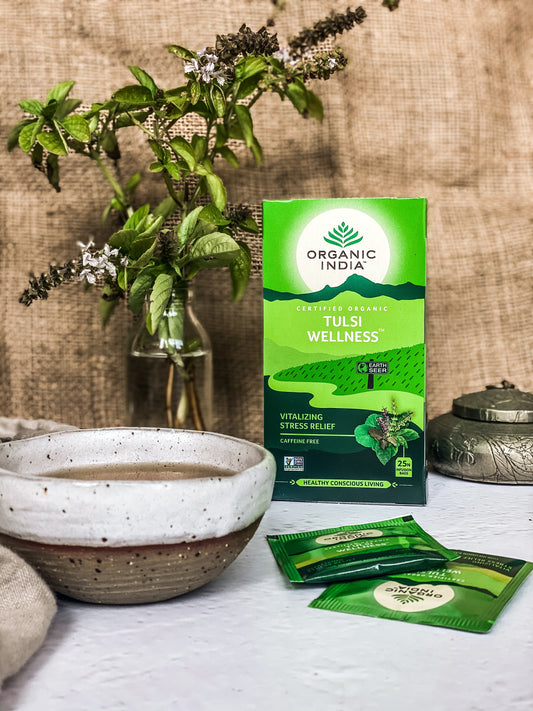Nurturing Sustainable, Intergenerational Livelihoods in Rural India
Goal Number 1 of the 17 United Nations Goals for Sustainable Development is Poverty Eradication. In fact, it is listed as the greatest global challenge and an indispensable requirement for sustainable development. Two of the United Nations priority actions on poverty eradication are:
- Improving access to sustainable livelihoods, entrepreneurial opportunities and productive resources
- Addressing the disproportionate impact of poverty on women
By directly working to address poverty in rural areas of India, for both men and women, ORGANIC INDIA is actively working toward achieving these two vitally important priority actions.
For more than 20 years, ORGANIC INDIA has worked in partnership with small rural farmers, who now number in excess of 2000. ORGANIC INDIA has a commitment to the economic success of its farmers, their families and local rural villages. This commitment is at the heart of their business model, and one of their fundamental principles: putting people and the planet before profits.
The following are just some of the ways ORGANIC INDIA is not just improving the economic situation for men and women in rural India, but facilitating sustainable livelihoods for generations to come.
- Unique Partnerships with Farmers
ORGANIC INDIA works directly with rural family farmers in India and covers the fees associated with acquiring organic certifications. They then purchase the harvested crops and herbs at a premium market price, ensuring sustainable income for the farmers.
This is how the partnerships work:
- Once the farmer decides to become a partner, ORGANIC INDIA assigns them an ‘agriculture team’ who live with the farmer to teach them how to become a regenerative farmer. These teams are all agricultural experts, holding Masters and PhD degrees in Agriculture, and they motivate, guide, monitor and pay the farmers. Farmers are also paid the costs associated with their eventual organic certification.
- Before cropping season starts, the individual farmers are provided with options to grow certain crops, and together they decide upon crops, prices and quantities to be grown that season. ORGANIC INDIA then provides the farmer with seeds.
- At the end of the season, once the crops are grown, ORGANIC INDIA purchases the crops for use in organic teas and herbal supplements. All the herbs and spices you find in their Tulsi tea and herbal supplement range are sourced from these farmers and some wildcrafters.
- ORGANIC INDIA ensures that farmers’ crops are of the highest quality, are purchased on time, and payment is made upon purchase.
- Farmers also rotate between growing crops on their land for ORGANIC INDIA with growing other organic food crops for their family.
This unique business model makes it possible for farmers to prosper with farming skills that regenerate the Earth and that can be passed on to future generations.
- Improving Economic Opportunities for Women
“I have worked here for the past 20 years; one of my daughters is working here. I am happy because this work pays me well to run my family, it helps me to fulfil my family’s needs.” Sundari Devi, one of ORGANIC INDIA’s female farmers.
Women living in small communities throughout rural India are often marginalised, receiving little education, unequal opportunities and unfair pay. ORGANIC INDIA is working to address the disproportionate impact of poverty on women by directly improving their economic opportunities in the following ways:
- Employment of women at equal rates in the fields and processing plant. ORGANIC INDIA employs women to play an integral role in the family farms, working together in the fields whilst being paid equal wages to the men of the family. Women are also employed in processing; in fact, 95% of employees at the processing plant in Chittoor are women.
- Employment of marginalised women. ORGANIC INDIA has worked to ensure marginalised women such as widows, the elderly and illiterate have employment opportunities that were once non-existant. These women become integral to the farm, working with their family in the fields with a shared purpose.
- Training programs for women to improve employment opportunities. ORGANIC INDIA provides job skills training programs to empower women and to improve their employment opportunities. Female farmers are educated in agricultural practices, and as a result, women are now leading operations on farms, a role traditionally undertaken only by men.
- Programs in other fields are also provided to women, to facilitate employment opportunities beyond the farm.
By choosing ORGANIC INDIA Tulsi Tea you are supporting the men and women of rural India, and taking positive action toward one of the greatest global challenges: eradication of poverty. Thank you for being part of ORGANIC INDIA’s mission.












